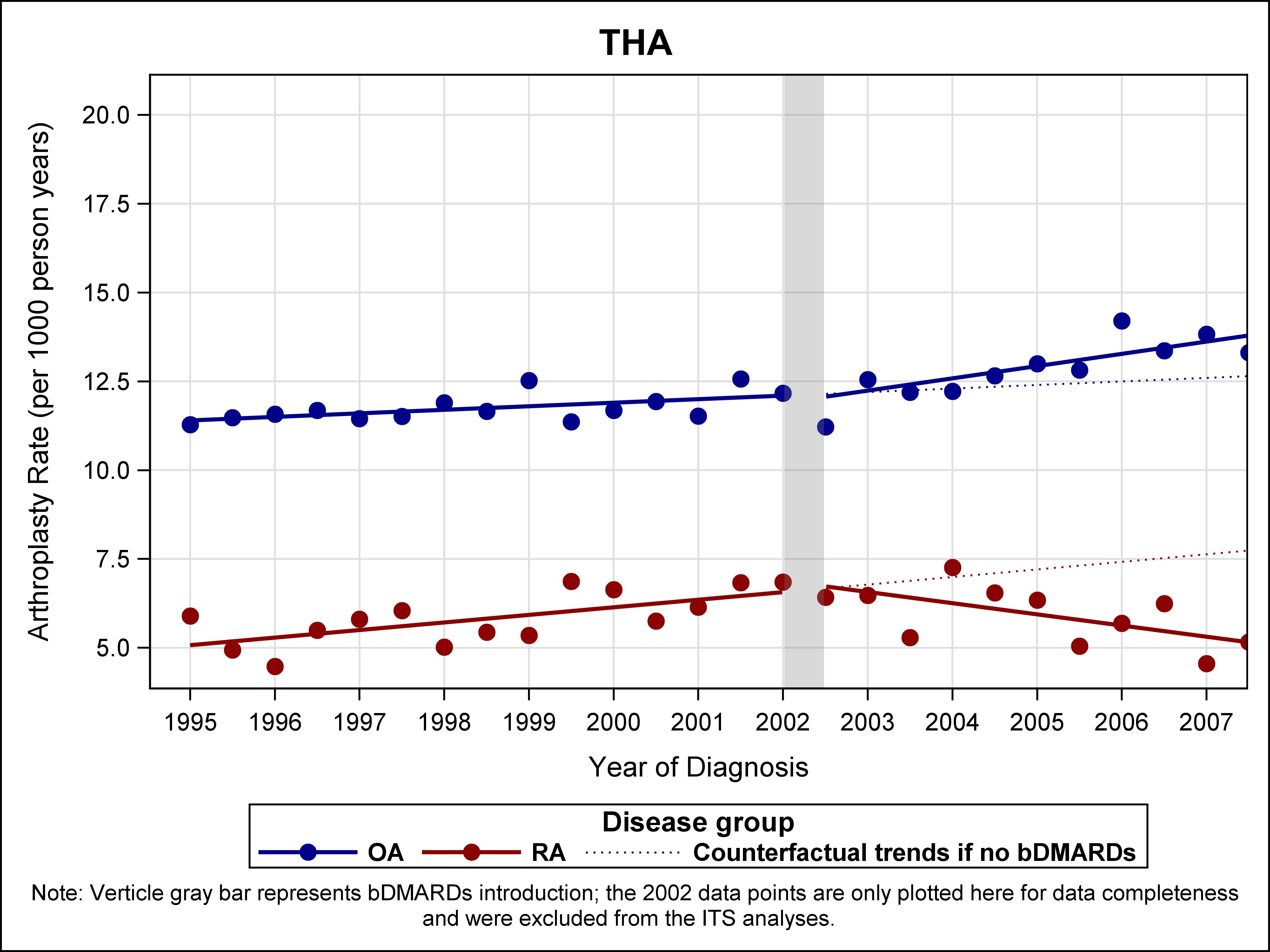Session Information
Date: Tuesday, November 9, 2021
Title: Abstracts: Epidemiology & Public Health II: Inflammatory Arthritis (1923–1926)
Session Type: Abstract Session
Session Time: 3:30PM-3:45PM
Background/Purpose: Total joint arthroplasty (TJA) is an undesirable long-term outcome of rheumatoid arthritis (RA) due to joint damage from uncontrolled inflammation. Although biological disease-modifying anti-rheumatic drugs (bDMARDs) would be expected to reduce the need for TJA due to better control of inflammation, evidence is conflicting. We aim to investigate whether the introduction of bDMARDs was associated with reduced incidences of total hip and knee arthroplasty (THA/TKA) among patients with RA compared with osteoarthritis (OA).
Methods: Using a population-based cohort in British Columbia, Canada, RA and OA patients diagnosed between 1995–2007 were divided into semi-annual cohorts according to diagnosis date. For each cohort, we calculated 8-year incidence rates of THA and TKA. We compared levels and trends of THA and TKA incidence in people with RA/OA diagnosis during pre-bDMARDs (1995–2001) and post-bDMARDs (2003–2007) periods using interrupted time-series analysis, adjusting for baseline characteristics
Results: We identified 60,227 RA and 288,260 OA incident cases. For cohorts diagnosed pre-bDMARDs, 8-year incidence rates of THA and TKA increased over time in both RA and OA. For cohorts diagnosed post-bDMARDs, these rates decreased over time in RA but continued to increase for OA. For RA, differences between the post- and pre-bDMARDs secular trends in incidence rates were -0.49 (p=0.002) for THA and -0.36 (p=0.003) for TKA, compared to +0.40 (p=0.006) and +0.54 (p< 0.001), respectively, for OA. For cohorts with RA diagnosis five years after bDMARDs became available, 8-year incidence rates were 26.9% and 12.6% lower for THA and TKA, respectively, than expected rates based on extrapolation of pre-bDMARDs trends. In contrast, corresponding rates in OA were higher by 11.7%, and 16.6%, respectively.
Conclusion: Arthritis onset after the introduction of bDMARDs is associated with a significant decrease in THA and TKA incidence in RA, but not in OA.
 8-year incidence rate (per 1000 person years) of total hip arthroplasty (THA) among RA patients compared with OA patients. Abbreviations – bDMARDs: biological disease-modifying anti-rheumatic drugs; ITS: interrupted time-series.
8-year incidence rate (per 1000 person years) of total hip arthroplasty (THA) among RA patients compared with OA patients. Abbreviations – bDMARDs: biological disease-modifying anti-rheumatic drugs; ITS: interrupted time-series.
 8-year incidence rate (per 1000 person years) of total knee arthroplasty (TKA) among RA patients compared with OA patients. Abbreviations – bDMARDs: biological disease-modifying anti-rheumatic drugs; ITS: interrupted time-series.
8-year incidence rate (per 1000 person years) of total knee arthroplasty (TKA) among RA patients compared with OA patients. Abbreviations – bDMARDs: biological disease-modifying anti-rheumatic drugs; ITS: interrupted time-series.
To cite this abstract in AMA style:
Zhou V, Lacaille D, Lu N, Kopec J, Garbuz D, Qian Y, Avina-Zubieta J, Esdaile J, Xie H. Has the Incidence of Total Joint Arthroplasty in Rheumatoid Arthritis Decreased in the Era of Biologics Use? A Population-based Incident Cohort Study 1995–2015 [abstract]. Arthritis Rheumatol. 2021; 73 (suppl 9). https://acrabstracts.org/abstract/has-the-incidence-of-total-joint-arthroplasty-in-rheumatoid-arthritis-decreased-in-the-era-of-biologics-use-a-population-based-incident-cohort-study-1995-2015/. Accessed .« Back to ACR Convergence 2021
ACR Meeting Abstracts - https://acrabstracts.org/abstract/has-the-incidence-of-total-joint-arthroplasty-in-rheumatoid-arthritis-decreased-in-the-era-of-biologics-use-a-population-based-incident-cohort-study-1995-2015/

